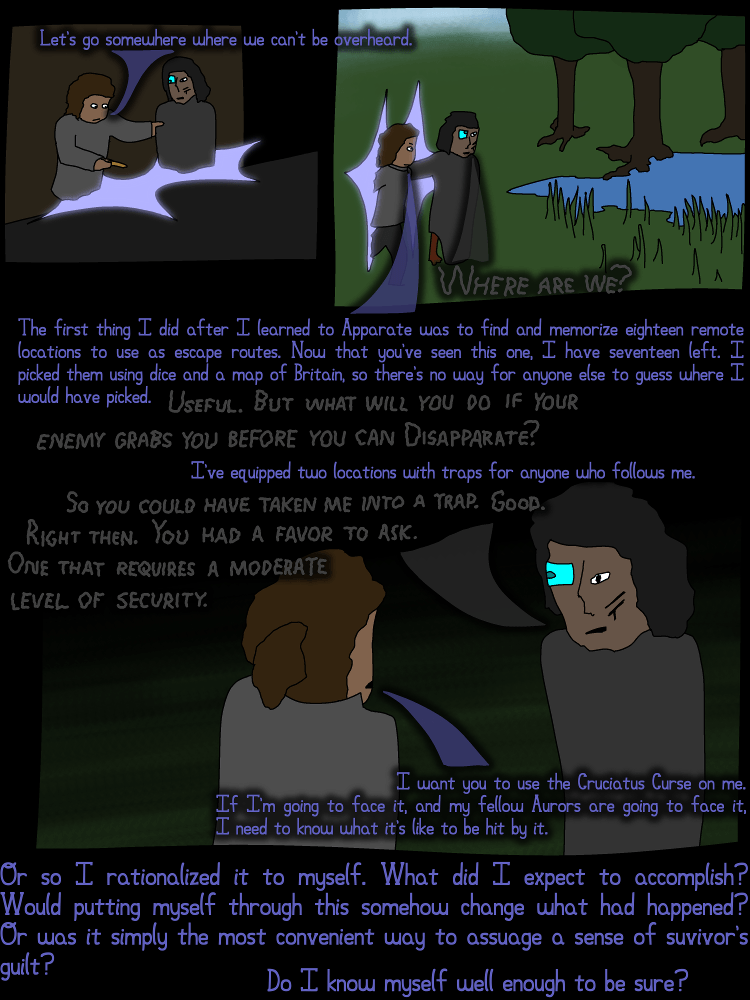Granger may be second-guessing zemself here, but to Moody, that explanation seemed perfectly sensible and logical!
This was obviously before Granger instituted the policy about saying “Torture Curse” instead of “Cruciatus Curse.”
Granger also has escape locations outside of Britain, but there's a limit to how far you can Apparate. Those locations are only relevant while Granger is travelling to other countries.
One thing that I left out of this page was to have Granger and Moody confirm each other's identities before leaving the Ministry. It would have added to the “Moody is totally serious about security, and so is Granger” thing, but I couldn't come up with a good way to do it. They could have security questions, but the bigger threat is if the person is under the Imperius Curse. (Can that curse force someone to give the proper answer to a question? I'd guess that it can.) The real Granger can resist the Imperius Curse, but it wouldn't be Moody's style to trust in that.
The only clever solution I came up with was for the two parties to make an Unbreakable Vow that they would truthfully reveal their identity and whether they're acting of their own free will. However, if that style of thing worked, people could use Unbreakable Vows for all kinds of things, which would change a lot of stuff about society in unexpected ways. So I figure there must be some major additional restrictions on the Vow that make it undesirable for general use. (Also, it requires a third person.)
Approximate readability: 9.60 (1195 characters, 258 words, 14 sentences, 4.63 characters per word, 18.43 words per sentence)
 encourage me
encourage me


Comments
Her reasoning makes perfect sense to me, but I have skewed priorities in that area, and I'm aware that for many people it would be a rationalization.
I feel the same way, and I don't think my priorities are “skewed” (how would you define that anyway? What does it mean, other than “different than a lot of people's”?). There's no reason a rationalization can't be a perfectly good reason in-and-of itself. My theory is that Granger first had the impulse to do this, then came up with this reasoning, decided the reasoning was logical enough, and went through it. Indeed, very few decisions are based on pure logic from the beginning, so rationalization is a useful tool, as long as you scrap the decision if none of your rationalizations hold up to scrutiny.
By the way, “Hexes” confused me for a moment, since hexes are also an actual thing in this setting :P
Yeah. On the other hand, I'm reminded of those experiments with waterboarding, which seemed to conclude that torture is still highly unpleasant even when you're having it done to you on purpose.
Of course that does still leave a lot of ways for it to change stuff... Maybe being found to have made an Unbreakable Vow would be kind of a scandal, because it drives people to do drastic things to keep from violating it.
Maybe the world runs on a vast system of secret Unbreakable Vows...
Nah, probably not
First, the Vow I proposed is very short-term; once you've stated your identity, you're free of it. The chances of dying by that Vow are about the same as the chances of dying by walking down a flight of stairs. (It does kill you if you're under the Imperius Curse and you falsely claim that you're not, but if you're under the Imperius Curse, there are already lots of ways for your controller to kill you.)
Second, there's a lot of circumstances that are certainly important enough to justify it. Any oath of office could be an Unbreakable Vow, which would eliminate most corruption in [the Aurors / the Wizengamot / take your pick]. And why imprison someone in Azkaban (which is both escapable and expensive to maintain) for a major crime when you could instead force them to take a Vow that they will never again knowingly commit a crime? (Restrict that to major/violent crimes if you're feeling particularly lenient, but I doubt society cares enough for convicted persons that they'd worry about a few people dying from committing minor crimes after that.)
On a creepier note, I would also fully expect that people would demand for marriage vows to be Unbreakable...
As someone who suffered significant childhood trauma largely because my mother felt that divorce was morally absolutely wrong, this concept terrifies me.
It seems possible that at some point in the past, perhaps around the time the Unbreakable Vow was invented (or discovered? I don't know how magic works), people started using it for everything, as part of a social emphasis on honesty and trustworthiness. The negative effects on society of people being constrained by their words (both from the largely increased death rate and from the actions of those bound) rapidly led to a string of horrors that left an abhorrence for the spell deeply embedded in the society, which was passed down to children.
That's the only restriction I can figure out. It's possible there is some great cost to the caster, but it seems out of character for Bellatrix to undergo such expense/risk for zir nephew. It's probably not a legal restriction, because it'd be an extremely useful tool for a Dark Lord who cared more about efficacy than minions, but we only see it used once. The only other thing I can think of that would cause such widespread non-use is a deep societal stigma.
With this theory, there are probably a lot of families who have a “dirty little secret” that someone in the family has made an Unbreakable Vow. The one Bellatrix facilitates could be exactly that sort of thing.
Another aspect is that there can still be institutionalized, abusive use of the Vow - it's just not public. There are probably boarding schools for minority children (e.g. werewolves) where Unbreakable Vows are used to control children's behavior, where no one with power cares if a few of them die because of it.
That link is an interesting note - I spent a large portion of my childhood living just off a street named Indian School, but I hadn't thought about why it was called that.